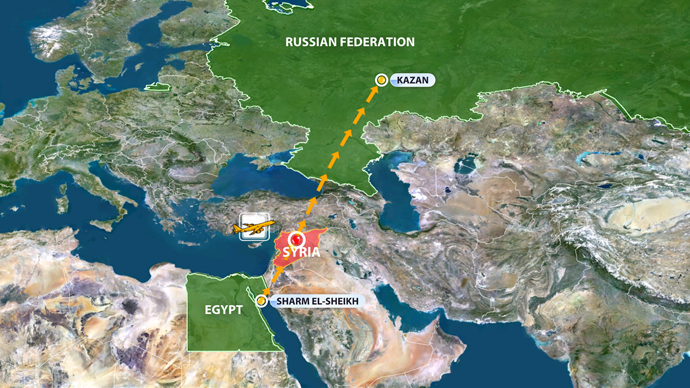Two missiles were reportedly fired at a Russian plane with at least 159 passengers on board flying over Syrian territory.
On Monday Interfax cited “an informed source in Moscow,” which reported that a Russian passenger plane was attacked, while flying over a mountainous area of Syria.
“Syrian [officials] informed us that on Monday morning, unidentified forces launched two ground-to-air missiles which exploded in the air very close to a civilian aircraft belonging to a Russian airline,” the source told the Russian agency.
“No one was injured, and the plane was not damaged. The aircraft landed in Kazan as had been planned,” the Russian Federal Agency for Tourism told news agencies. There were 159 passengers and eight crewmembers aboard the aircraft.
The plane that was allegedly targeted belonged to Nordwind Airlines – a Russian charter air carrier – and was identified as an Airbus A320. On April 29 it was en route to the city of Kazan, in Russia’s republic of Tatarstan, from Egypt's resort city of Sharm el-Sheikh.
The Russian Foreign Ministry said on its website the plane’s crew at 4:55pm Moscow time (12:55 GMT) “detected battle action on the ground that, according to the crew, could constitute a threat to the 159 passengers on board the plane.”
The ministry is now “taking emergency measures to clarify all the circumstances of this situation, including making contact with the Syrian authorities,” spokesperson Aleksandr Lukashevich said.
Airbus A320 specifications
Cockpit crew: 2
Seating capacity: up to 180
Length: 37.57 m
Wingspan: 34.10 m
Operating empty weight: 42,600 kg
Cruising speed: 828 km/h
Maximum speed: 871 km/h
Maximum range: 5,900 km
Service ceiling: 12,000 m
On Tuesday, Interfax’s source informed that the aircraft was allegedly attacked when it was flying at an altitude of 9,800 meters.
“The first missile detonated at 9,200 meters, the second one at 8,900 meters”, the source said.
After the crew reported the incident to Syrian ground control, the flight was allowed to gain altitude of nearly 1,000 meters more, according to the source.
Meanwhile, Russia's federal air traffic agency Rosaviatsia on Monday issued a directive to all Russian airlines prohibiting routes through the Syrian airspace. Previously in February it issued a warning to all Russian airlines to avoid routes over conflict zones.
Russia’s major airlines - Aeroflot, Transaero, S7, Tatarstan - have avoided Syrian airspace for months due to the situation on the ground, despite additional time and fuel expended to avoid Syrian territory.

Meanwhile, Syrian aviation authorities received no indication of the alleged attack on the Russian plane, says the director of Syrian Airlines, Ghaida Abdullatif.
“We contacted the service that monitors traffic within Syrian airspace. None of the air traffic control services or other ground services at the airports in Damascus and Latakia have confirmed the information of a Russian plane being fired at."
Russian experts believe that, so far, there are no grounds to claim that the aircraft became a target of a missile attack. Moreover, some of them voiced their doubts that a passenger plane can actually perform the kind of maneuvers that would allow it to avoid a missile attack.
“Planes are usually attacked either from the side or from above. A pilot could not have seen the missiles,” Vladimir Gerasimov, a Russian pilot and an expert on flight security told RT.
"A passenger plane crew simply couldn’t see what’s behind. And if something is approaching the plane from the opposite direction – the speed doubles, so there is no time to do anything,” he added.
Danny Makki of the Syrian Youth Movement in the UK believes that the incident is no doubt a rebel attack, which could have been carried out with weapons supplied by neighboring governments or taken off the Syrian army. He thinks that the attack is an intentional one and should receive widespread condemnation, just as the attacks carried out by government forces do.
“The most likely thing that could have happened was rebel fire from missiles that could have been given by regional countries or government forces… no rebel forces would fire a missile at civilian aircraft without it being done intentionally. So it is essentially another reprehensible act that would have been committed by rebel forces, and should gain condemnation from all the states after it is clearer who actually committed it”, Makki said.
“But it does show that these are not the liberal forces which the West wanted to arm in the first place,” he added.
The civil war in Syria between the government of President Bashar Assad and opposition forces has been raging for over two years, claiming the lives of more than 70,000 people according to UN estimates. Assad says he is fighting an insurgency that has been sponsored from abroad.
